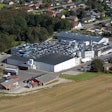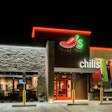Quality feed delivery pays: Not just in keeping current customers, but in attracting new business beyond traditional markets. The trucking team at Southern States Cooperative's Park City, Kentucky, feed plant is extending its traditional quality commercial feed delivery performance into the demanding realm of poultry breeder feed delivery.
Delivering breeder feeds puts these Southern States truckers on the frontlines in helping to maintain biosecurity in the international poultry industry. The Park City team members are a critical force in the defense against salmonella and other pathogenic bacteria that could infect breeding birds, hatcheries, and broiler chicks. Their role in helping to prevent the spread of disease may become even more important if, or more probably when, highly pathogenic avian influenza reaches North America.
The Park City truckers' enhanced biosecurity procedures and experience also benefit Southern States' traditional livestock feed customers. Moreover, Park City's breeder feed business helps cover the cost of other feed delivery and the co-op's bottom line.
The Park City trucking team has had a long history of safe, efficient feed delivery, including top honors in the 1993 Truck Fleet of the Year Program under the leadership of Bill Monroe. In August last year, under the guidance of feed plant manager Gary Huddleston, plant superintendent Garrett Costello, traffic supervisor John Button, and QA supervisor Larry Ronethe Park City truckers raised the bar even higher with HACCP certification for their bulk feed delivery operations. The new program for hazard analysis and identification of critical control points of the trucking operation offered even greater assurance of safety and quality in Southern States-Park City 100% bulk feed delivery.
Rising to the demands of the new HACCP program and some of the country's highest biosecurity and other technical delivery requirements ranked the Southern States-Park City truckers as the Most Improved Truck Fleet for 2006 in the annual Truck Fleet of the Year program jointly sponsored by FEED MANAGEMENT and the American Feed Industry Association. During the past fiscal year, the Park City team drove more than 450,000 miles, delivering nearly 51,000 tons of bulk feeds in central and western Kentucky and neighboring states. Seven full-time drivers and one backup driver worked five bulk-semi units and four bulk-body units (see table Trucking team').
Plant manager Huddleston acknowledges the challenge to improve on the fleet's historically strong record of safe, efficient performance. However, he says, feed delivery is always dynamic: During the past fiscal year, the Park City fleet experienced steeply rising fuel costs like other feed trucking operations. The fleet was able to hold the rise in total cost per mile to only 9 cents from FY2004 to FY2005, while average total operating cost per ton increased only 49 cents during the same period. Adding to overall fleet expenses, however, were maintenance costs for the good-running, but mature mixed bulk delivery fleet of straight trucks and semi-tractor-trailer units (see table, Rolling stock').
Drivers reinforcing breeder farm biosecurity
Making hygienic breeder feeds is demanding work and the customer, a leading international poultry genetics company, set high technical standards for the Park City plant, including frequent swabbing' and testing for salmonella in the nearly 30-year-old slip-form concrete plant built by T.E. Ibberson. The pellet-crumbles quality standard was set at 80% PDI delivered.
Southern States' Park City feed plant meets and maintains the genetics company's high technical standards, with the result that its breeder feed business rose to around 16,000 tons in the past fiscal year, nearly one-fifth of the plant's total output of bulk feeds. Now two of the Park City bulk trailers are dedicated to breeder feeds. Standard operating procedures for these units include spray disinfection of truck and trailer tires on entry and exit from the breeder farms, as well as other biosecurity measures.
The genetics company's biosecurity measures focus on salmonella, which is both a risk in itself and a marker' for other pathogenic bacteria affecting the poultry industry. However, many of the HACCP-based biosecurity steps also would apply in the event that the H5N1 avian influenza virus threatened the poultry breeder farms.
"A big factor in getting and keeping the poultry breeder business," says Huddleston, "is the reliable high quality of our delivery, thanks to our drivers. Park City trucks never test positive'."
At each of the bi-monthly fleet safety training meetings, Huddleston and plant superintendent Costello, going on his second year at Park City, provide a poultry breeder update'.
When FM and AFIA visited the fleet recently, Huddleston told the drivers about the poultry breeder's new pink-colored feed, pigmented with a high-intensity iron oxide tracer, containing salinomycin for use only in special starter feeds. At the meeting, the Park City drivers reviewed procedures to ensure that the new medicated product never contaminates the breeder feeds. The breeder production manager visits the Park City plant at least once per year and makes a point of meeting the drivers.
"Our customer reviews their biosecurity procedures and tells us what is new with them," Huddleston says. "But they also want to hear from our drivers: What are the drivers' main concerns in maintaining safe feed delivery to the farms? Every driver knows there's a little different world on the breeder farms."
Testing driver training
Delivering to breeder farms was a very different world starting out for the majority of Park City truckers, who have backgrounds as OTR drivers. In recent years, retirements and new hires have lowered the average length of driver employment to around 3.5 years. To build feed-related driver skills and safety awareness in newer drivers, Huddleston and Costello have put extra effort into training.
The bimonthly driver safety training meeting attended by AFIA and FM started at 06:00 hours and covered hazard communications, lock-out-tag-out, and feed safety rules. Fortunately for AFIA's production director Keith Epperson and this editor, the meeting also included complimentary breakfast biscuits and plenty of coffee. Truck drivers also participate in the Park City plant's overall Safety Committee, which meets monthly.
The early-morning safety training meetings also include written tests. During the AFIA-FM visit, drivers took a quiz on fire prevention. Sample question: "ABC type extinguishers work on which type of fires?" (1) ordinary combustibles; (2) flammable liquids; (3) electrical; (4) all of the above."
Southern States-Park City trucks are safety-equipped' with fire extinguishers, spill control equipment, and safety warning devices. Drivers carry their own copy of the emergency procedures manual, Southern States' toll-free emergency phone number, and a cell phone supplied by the company.
What is the Park City fleet's cell phone driving policy? "We encourage drivers to stop in a safe place to take calls or make calls," Huddleston says. The Park City truckers are aware of the link between cell phone use while driving and increased risk on the road. While safety yields its own rewards, Southern States also provides a monetary incentive based on years of driving without accidents.
HACCP insight to operational issues
When HACCP analysis is applied to feed delivery, Huddleston notes, it generates operational details that prevent errors as well as enhance error recovery and enable the feed safety and quality assurance system to adjust to changing situations.
"Our HACCP program points up that new drivers particularly need to focus on learning load out, especially cleanout procedures," Huddleston says. "The program also led directly to our Bulk Trucking Guide Book' which keeps everybody up-to-date on quality assurance issues. So we keep reminding drivers: Keep your Guide Book up-to-date, it's your bible!'"
Customers have remained major variables in Park City's delivery QA system. In the case of one delivery of feed to a customer's poorly marked feed wagon, the HACCP program triggered training for the driver, plus action to properly mark the customer's wagon. The HACCP program also led to the use of two customer feed tags to go out with every load of feed, one for the driver to replace the existing tag on the farm bin, and the other for the customer's delivery record.
"Many farmers in our area are having a tough time," Huddleston notes, "so there is a tendency for them to put off needed improvements. Sometimes this results in a delivery safety issue. We try to get farmers to fix their own bins, but usually they don't see the safety problem. So we negotiate arrangements to fix a bin: Ladders, lids, etc. We'd rather be safe than sorry. Usually, if we offer to pay for it, they'll let us fix it."
Traffic supervisor Reynolds keeps Park City's delivery map books updated, from which drivers can make copies for their own use. Drivers update the pages for individual customers to include notes that keep track of specific changes on the farm, new bin locations, and changes to utilities like electrical wires, potential safety problems, etc.
Huddleston also points out that Southern States-Park City drivers have to pay special attention to meeting the HACCP requirements during the seasonal changes that are part of the commercial feed business. For example, he tells the trucking team to keep in mind that the feed stores are extremely busy in the spring, working 14-hour days, and not always thinking about their feed supply. Similarly, farmers are busy planting and may not know they need feed until they switch on the auger and nothing comes out.
"A big part of customer service," former traffic supervisor Button says, "is trying to think about the delivery from the customer's point of view."
Building the trucking team
As team member Reynolds has taken over as traffic supervisor, Button has returned to driving full time. However, his coaching ability has landed him the informal job of mentoring new drivers. This task, which includes at least a week on the road with each new hire, requires good interpersonal communication. A 'git 'r done' attitude to feed delivery training usually slows up the process.
"Driving the truck is the easy part," Button says, "Load sequencing, cleanout procedures, etc. are more challenging."
In the driver safety training meeting during the AFIA-FM visit, superintendent Costello paid special attention to substance abuse rules. Plant manager Huddleston, traffic supervisor Reynolds, and superintendent Costello had received special training on recognizing the physical, behavioral, speech, and performance indicators of alcohol and drug use.
"We're trained to help employees out," Costello emphasizes. But he also notes Southern States' prohibition against substance abuse, testing positive or refusing to take a test is grounds for dismissal. Testing of employees is completely random, conducted by an independent clinic through the county's health office.
"If drivers or other employees come to us for help with a substance use problem, we will help," Huddleston explains. "But every job in transportation or production is a safety-sensitive function', which means, one 'strike' one confirmed positive test or test refusal, and you're out."
Huddleston, Costello, and Reynolds promote an open-door policy to help build teamwork among the Park City truckers. Innovative ideas come through when that door is open, Huddleston says.
Huddleston says this approach, innovation from drivers up the chain and back down, is necessary to maintain productivity in face of mounting costs and other challenges to commercial feed delivery. At the same time, he says, everyone has to pay attention to day-to-day safety, with encouragement to help build a better, safer system of delivery.
Southern States insists upon superior customer service, Huddleston says, but the Park City drivers go beyond to help build business: "Customers know a lot about Southern States and the Park City operation just by knowing our drivers. These guys are having fun providing great customer service. That says a lot about quality feed delivery without saying a thing."





.jpg?auto=format%2Ccompress&fit=crop&h=167&q=70&w=250)












